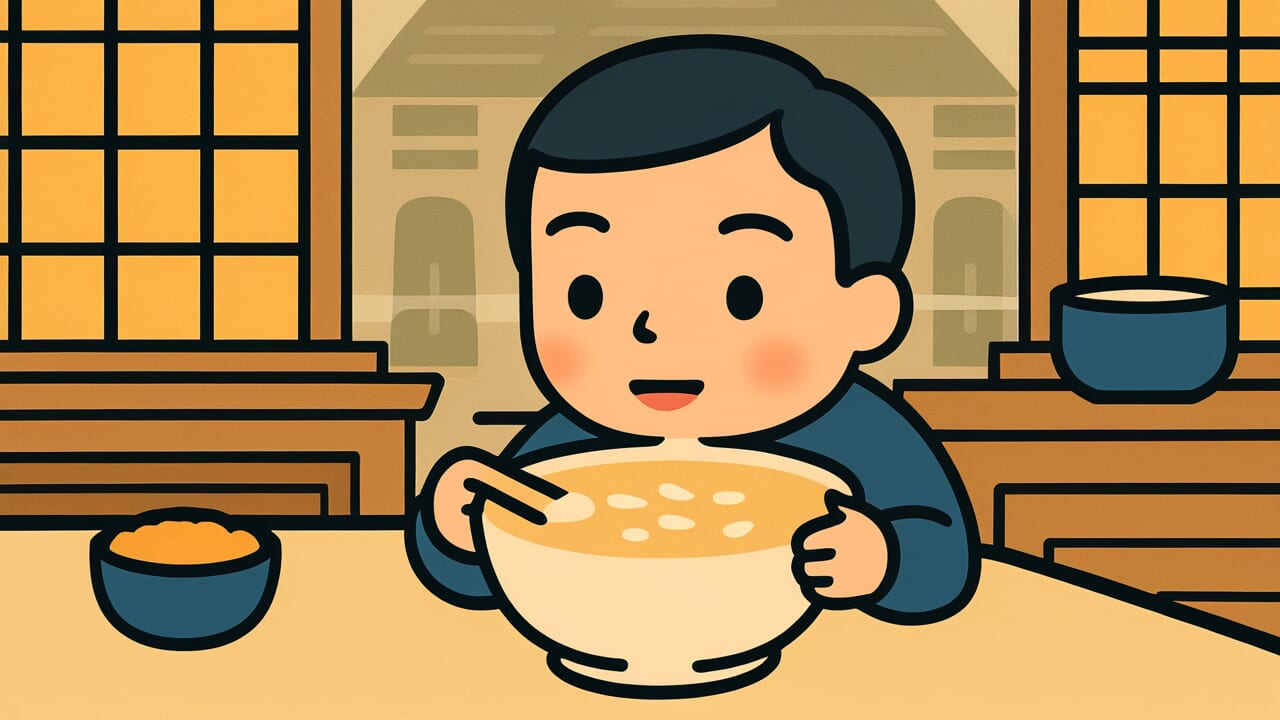How to Read “Rice gruel with tea in the morning stomach”
Asahara ni chazuke
Meaning of “Rice gruel with tea in the morning stomach”
“Rice gruel with tea in the morning stomach” is a proverb that describes something extremely easy to do. It refers to tasks that require no effort or struggle whatsoever.
Just as tea-soaked rice slides down smoothly into an empty morning stomach, this saying describes situations where things go effortlessly. There’s no resistance, no difficulty at all.
People use this proverb when a seemingly difficult task turns out surprisingly simple. It also applies when something you worried about ends up being no problem at all.
When you say something was “like rice gruel with tea in the morning stomach,” you’re expressing how unexpectedly easy it was. The phrase conveys a sense of pleasant surprise.
Even today, you can use this saying in many situations. Maybe an exam was easier than expected. Perhaps a complicated procedure went smoothly.
The proverb carries nuances of relief and mild astonishment. It captures that feeling when anticipated difficulties simply never appear.
Origin and Etymology
No clear written records explain the origin of this proverb. However, scholars believe it emerged from common people’s eating habits during the Edo period.
Eating tea-soaked rice right after waking up was the simplest, most casual meal for Japanese people back then. Chazuke requires almost no cooking effort.
You just pour tea over cold leftover rice. No fire needed, no special preparation required. It perfectly symbolized “something you can do immediately without any trouble.”
The word “morning stomach” carries special significance here. An empty morning stomach accepts any food smoothly without resistance.
Pouring light food like chazuke into this receptive state creates an image of effortless consumption. Everything slides down easily.
The proverb combines two layers of easiness. First, the morning hunger makes eating effortless. Second, chazuke itself is the simplest possible dish.
This double ease creates the meaning of “absolutely no struggle” or “completely effortless.” The expression was born from ordinary people’s daily life experiences. It carries the authentic feeling of lived reality.
Usage Examples
- I worried so much about that certification exam, but it was like rice gruel with tea in the morning stomach—I passed easily.
- I thought my boss would be angry when I reported it, but it was rice gruel with tea in the morning stomach—he approved right away.
Universal Wisdom
“Rice gruel with tea in the morning stomach” contains deep insight about the gap between anticipatory anxiety and actual experience.
Before tackling something, we often imagine difficulties greater than reality. Fear of the unknown, anxiety about failure, worry about others’ judgment—these emotions inflate problems that haven’t even happened yet.
But when we actually try, things often go surprisingly smoothly. Our ancestors compared this experience to eating chazuke on an empty morning stomach.
This proverb has survived through generations because this human tendency never changes. People in every era feel anxious beforehand, then think “Oh, that was nothing” afterward. The cycle repeats endlessly.
What’s fascinating is that this proverb doesn’t just mean “it was easy.” It specifically captures the psychological gap of “it was easier than I thought.”
Humans can only know true difficulty through actual experience. There’s always an unexpected gap between imagination and reality.
Our ancestors understood this limitation of human perception. They saw through the tricks our minds play on us.
When AI Hears This
After waking, humans experience a sharp rise in cortisol. This hormone awakens the body while triggering the liver to break down stored glycogen and raise blood sugar.
Morning naturally becomes a time when the body is “prepared to receive sugar.”
The rhythm of digestive enzymes deserves attention too. Amylase, which breaks down carbohydrates, reaches peak activity between 6 and 9 AM.
Rice in chazuke—pure carbohydrate—gets digested and absorbed most efficiently during these hours. Research shows morning consumption reduces digestive burden by about 30 percent compared to eating the same food at night.
Temperature effects matter too. Body temperature hits its lowest point upon waking, then rises after breakfast. This temperature increase switches on metabolism.
Hot tea poured over rice promotes blood flow to the digestive system better than cold food. It accelerates body temperature rise from within. Think of it as helping warm up the engine internally.
Edo period people knew nothing about circadian rhythms or enzyme activity. Yet through experience alone, they reached the optimal solution: “warm chazuke on an empty morning stomach.”
This demonstrates humanity’s sharp observational skills. It was a physiologically perfect breakfast strategy.
Lessons for Today
This proverb teaches modern people not to let pre-action anxiety control them. That thing you’re hesitating about because it seems difficult? It might be rice gruel with tea in the morning stomach once you actually try.
Modern society overflows with information. Before starting anything, we imagine countless difficulties. We see others’ struggle stories on social media and read failure cases online.
We decide something is “difficult” without ever experiencing it ourselves. But others’ experiences belong to them alone. Your difficulty level remains unknown until you actually try.
What matters is taking that first step instead of freezing in imagination. Career changes, new hobbies, repairing relationships—many things you worry about go surprisingly smoothly when you face them.
Of course, some things really are difficult. But you only discover that through actual experience too.
Don’t let anticipatory anxiety dominate your life. Have the courage to learn truth through real experience.



Comments